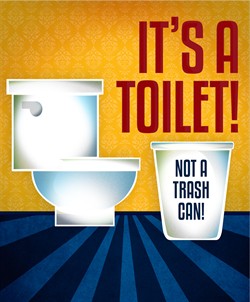 Flushable wipes, flushable kitty litter, flushable diapers, and the list goes on. You may think they have something in common and they do, none of these products are actually flushable!
Flushable wipes, flushable kitty litter, flushable diapers, and the list goes on. You may think they have something in common and they do, none of these products are actually flushable!
As people are adhering to the “Stay at home” order issued by Governor Mike DeWine, the Water Reclamation Facility (WRF) is seeing an increase in nonflushables being flushed. These nonflushables can wreak havoc on the sewer system, creating clogs and backups in the pipes as well as grating at the Water Reclamation Facility.
There are only a few things that should be flushed, and we have an easy method for remembering them. The 3 P’s. The 3 P’s consist of: pee, poop, and (toilet) paper. And sometimes, but hopefully rarely for most people, the fourth P: puke.
As a side note, human waste and animal waste breaks down differently, so animal waste should be disposed of in trash cans and not the toilet. Toilets are not trash cans.
We realize this is considered a gross subject to talk about, but the information is extremely important to keep the sewer system running, while also protecting the environment from harmful chemicals.
Below is a list of common items that should never be flushed. This is meant to be a quick reference but know there are so many more!
- Cotton balls and swabs
- Sanitary napkins
- Mini or maxi pads
- Condoms
- Tampons and applicators
- Cleaning wipes of any kind – sanitary, baby, disinfectant
- Dental floss
- Disposable diapers
- Bandages or gauze
- Automotive fluids
- Paint, solvents, sealants, or thinners
- Unused medications
- Fats, Oils, Grease
- Flushable kitty litter
- Fish for a funeral
- Pet poop
- Cigarette butts
- Contact lenses
- Chemicals of any kind
- T-shirts or rags
- Coffee grinds
- Hair
Keep a waste basket in your bathroom for easy disposal of the items above and more. Do not use your toilet like it is a trash can.
As we all work together to navigate the changes we are all experiencing, it is important to do our part and keep our systems working properly.
By: Elizabeth Holston
